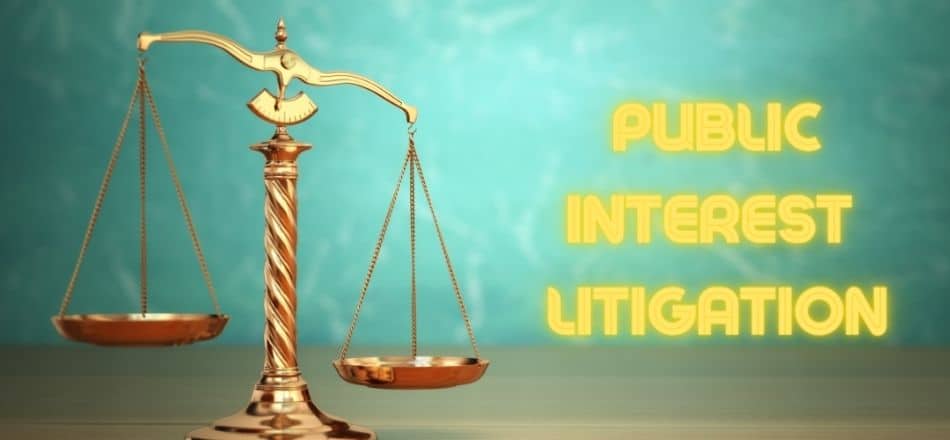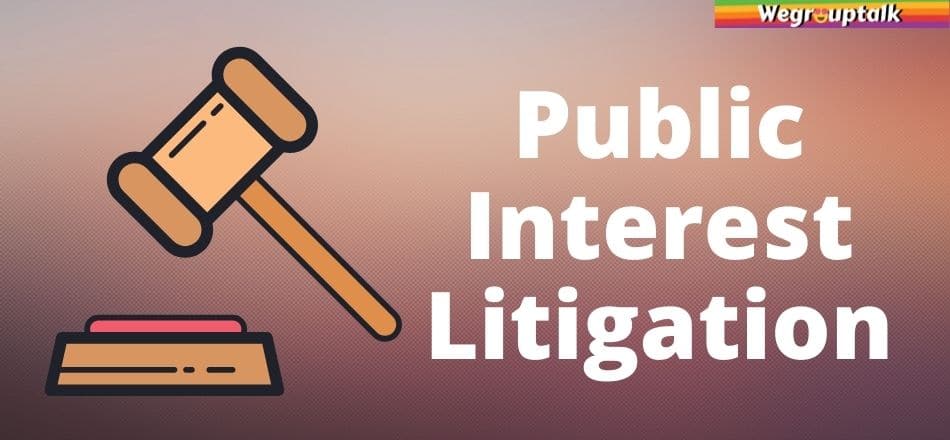PIL, which generally means Public Interest Litigation, is made for the underrepresented groups like the poor, the racial minorities, unorganized customers, or people who have a particular passion for environmental issues. The straight and precise definition of Public Interest Litigation is the “litigation filed in the court of law for the protection of public interest.” It can be anything like pollution, terrorism, and many other things. If, in any case, the interest of the public is affected, it can be taken as Public Interest Litigation in the court of law.
What is a PIL?
It is the authority given to the public by the courts and does not come under any act. It should be quite clear to the person who wants to file the petition and prove to the court that the petition is filed, keeping in mind the public’s interest. Some of the situations which can be seen under Public Interest Litigation are:
- Bonded Labor Matters
- The Not proper payment of minimum wages to the workers or exploitation of the workers
- Neglected Children
- Atrocities on women
- Environmental pollution and disturbance of ecological balance
- Food Adulteration
- Maintenance of heritage and culture
The first reported case of Public Interest Litigation was filed by Hussainara Khatoon vs the State of Bihar. The case revolved around prisons’ conditions and under trial prisoners; the issue released more than 40,000 prisoners.
Every citizen has the right to come out with his/her rights where a Public Interest Litigation can come into use. It keeps the rights and welfare of the people intact and let them come out with problems they are facing in their groups.

The procedure to file a Public Interest Litigation can be:
Any citizen or any group of people can appear in court to file a petition in the following:
- In Supreme Court – under Article 32 of the constitution
- In High Court – under Article 226 of the constitution
- In the Court of Magistrate – under Section 133 crPC
PIL is a boon for all, and here’s how:
- Gives voice to the minorities: There are people in the society who need their voice to represent their groups; in this case, PIL might be a good option. Not every group of the community is satisfied with working under law and order. Some people might be facing issues with their minor groups, and the only option is Public interest Litigation for the justice
- Lets the justice come out: If you look at Anil Yadav’s case in the year 1981, which took place in the state of Bihar. In the news later, it came out that 30 criminals were there who 2. Getting justice: If we look at the Anil Yadav case, which happened in 1981 in Bihar. The issue enfolds how the Bihar police blinded the 33 men who were criminals by throwing acid in their eyes. After this, the blind were shifted to Delhi on the orders of the above authorities. Also, the authorities took speedy action against the policemen who were involved in this. But this case shows how PIL has given the people a chance to get their rights under it.
- No limitation for any person: There is no limitation that only particular people can file PIL. It is indicated by the law that any person can file public Interest Litigation. As far as the ‘Locus Standi’ is concerned, it was relaxed by the government. It provides the freedom to anyone to file a PIL, which makes it more righteous in society to exist.
- Speedy Remedy: PIL is one of the things which is considered to be a speedy remedy. Everything moves from step to step, or a hierarchy takes time when it comes to laws or courts. Every credential is cross-checked, then it is implemented further. The decision might take a lot of time. It would not do justice to people who are looking for speedy justice. This is when PIL comes into use, where people are looking for instant justice and response.
- No limitations and boundaries: One of the satisfactory reasons is that there is no limitation for the issues that can be dealt with under Public Interest Litigation. The thing that needs to be kept in mind is that a PIL must be filed keeping in mind the interest of the groups of people rather than a single individual. Just thinking about a single individual and him filing a PIL would not be considered considerable by the law.
- PIL can be filed against anybody: There is no limitation to file a PIL against anybody because it can be filed against a State, Central Government, municipal authorities but not against any private party.

Significance of Public Interest Litigation:
- The main aim of PIL is to give ordinary people reach to the courts to get legal redress
- PIL is an essential thing for social changes ad it also helps in maintaining the balance between the law and justice
- PIL aims to focus and make justice accessible for the poor, minorities, and marginalized.
- It is the only way for the people to make the rights reachable for those who do not access them.
- It serves as one of the prime functions for keeping an eye on institutions like asylums, protective homes, prisons, and other places.
- It is also a robust tool for bringing in the concept of judicial review.
Why should PIL be considered a boon for all? Here are some of the examples supporting this:
- Hussainara Khatoon v. Home Secretary: This case from the state of Bihar was a landmark case in the year 1980. The case bought the notice on undertrial prisoners who have been in prison for more than what they get if they have also got convicted. This brought justice to the undertrial prisoners. This has been a critical case in the list and was filed by multiple prisoners.
- Vishaka vs the State of Rajasthan: This case was bought to notice by an advocate through Public Interest Litigation. In Bhanwari, a rape victim who fought for child marriage was boycotted with her whole family from the village. The criminal case which was made did not get her to the point of justice.
- Javed vs the State of Haryana: This case was filed by a party when they could not contest the election. A person who has more than two children would not be able to participate in specific vacancies in the Panchayat. This case was also bought in the family planning scheme. The authorities looked at the problem of population.
- M.C. Mehta vs UOI: The case was bought against polluting the Ganga river. This case was lodged by M.C. Mehta, a reputed environmental personality who has fought for various other pollution reasons for the Ganga. The case provided justice to the river bypassing multiple orders against the industries for setting up a sewage treatment plant. This case is on the top list of the cases made through PILs.
These cases clarify that it is crucial and how PIL has helped solve the significant issues of social or environmental issues or women’s concerns. It has solved the problems and has also bought the government’s eyes of such things that were being remained unnoticed ut was a risk to the society or environment. If a PIL is made correctly in the correct sense while keeping with all the norms, it is very beneficial.

Please keep specific guidelines, so there is no misuse of PIL by the public. They are as follows:
- The PIL should be genuine.
- The High Courts should keep a notice and have rules for the justified and genuine PIL so that any misuse or fraud can be avoided.
- Everything should be verified before even looking at the PIL.
- The court should be confident and satisfied after verified the credentials with the concerned authorities and then move forward with the PIL.
- The important things concerned regarding a PIL should be that the PIL is only bought to keep the public interest.
- To review all the PILs, the court should know and understand the urgency of an important PIL that needs to be addressed sooner than the others and then look at others. The PIL that needs urgent attention should be served first.
- There should be no personal benefit attached to the PIL.
The PIL can be filed in the high court or the supreme court, depending on what suits you. Both the courts have the right to accept and judge the PILs. There are no such high fees for filing a PIL. You have to pay the merest amount of RS 50 in court.
Follow us on FACEBOOK, INSTAGRAM AND TWITTER to stay connected.
Also read Green Revolution.




